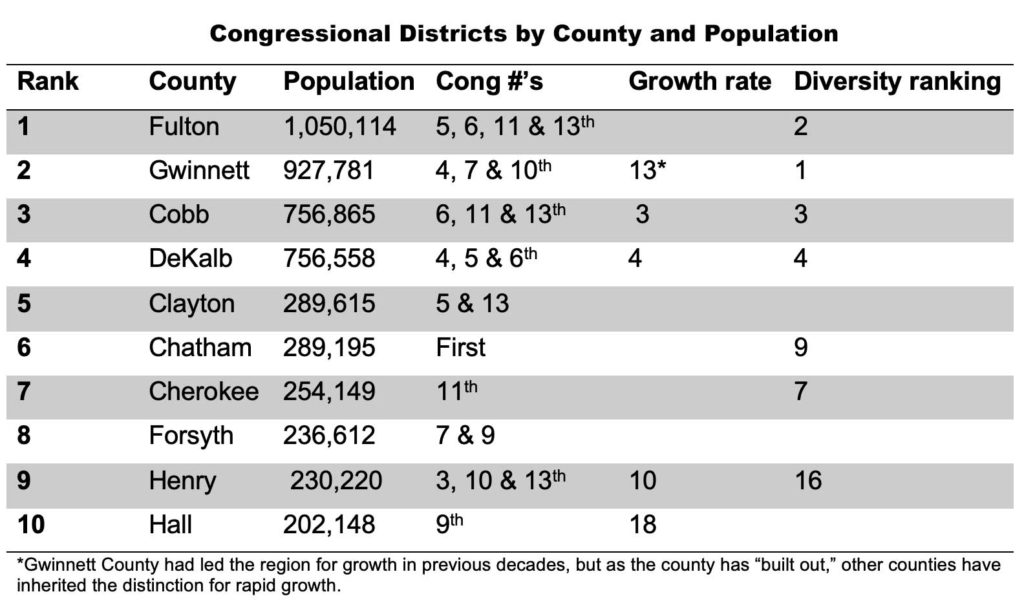
While a particular sword shaped district in North Carolina has become a favorite of political cartoonists who lampoon the practice of gerrymandering, Georgia’s House, Senate and Congressional district lines are also skillful examples of how political cartography can be utilized to preserve power.
The skillful slicing and dicing of increasingly diverse populations in Georgia have allowed Georgia Republicans to preserve power for the past decade even as the state grew rapidly and metro Atlanta counties became increasingly more diverse.
Governor Brian Kemp holds office by just more than 55,000 votes. Further, two 2018 statewide contests were forced into General Election runoff races. Owing to gerrymandered districts, Republicans hold a 105 to 75 margin in the House, a 35 to 21 margin in the Senate and an 8 to 5 margin in the Georgia Congressional delegation. If lines were drawn more fairly, the congressional delegation and House and Senate majorities would not be tipped towards one party so dramatically.
Georgia progressives are united in their desire to FLIP the House and Senate in 2020 in the hopes of drawing more representative maps for the next decade. To FLIP both chambers, Democrats must protect all current seats and win an additional 16 House seats and an additional seven Senate Seats.
Progressives hold out hope because they saw the Republican hold on power began to erode in favor of Democrats in 2018 with Congresswoman Lucy McBath’s victory over Rep. Karen Handel for the Sixth District congressional seat previously held by Newt Gingrich and Tom Price. Further, Democrats also FLIPped 13 House and Senate seats, with ten of those FLIPs by WIN List endorsed women. Democrats also protected a senate FLIP by Senator Jen Jordan which had removed the Senate supermajority during a 2017 special election.
As a result of these 2018 FLIPs for individual legislative seats, the Cobb, Fulton and Gwinnett legislative delegations in metro Atlanta also FLIPped to Democratic control for the first time in decades. This becomes an important distinction because it is the local legislative delegation which will draw lines for county commission, school board and city council races in each jurisdiction based on census results.
One need look no further than Georgia’s congressional map to see how Republicans “slice and dice” local jurisdictions to retain political control. Typically, those drawing congressional districts, which have just over 747,000 residents per district, attempt to keep counties intact within a district. This practice allows the Congressperson to provide better constituent services and work towards greater allocations of Federal funds to specific local governments.
In Georgia, counties and cities all over the map are split dramatically, even in jurisdictions where such splits are not necessary based on population density.
Four Georgia Counties have populations greater than a single congressional district, mandating some portion of the county would fall within two districts. Yet, portions of Fulton County are divided between four different congressional districts. Further, Gwinnett, Cobb and DeKalb counties are each divided amongst three congressional districts. Another county divided between three congressional districts is rapidly growing Henry County in the south suburbs which currently has a population of more than 230,000.
Counties with populations far smaller than a congressional district who are nevertheless divided between two congressional districts include Clayton, Cherokee, Muscogee, Clarke, Bibb and Fayette. These divisions of diverse or rapidly growing populations do not serve the citizens of those counties well.
The 2020 election cycle offers the best redress progressives have for an end to the current system where elected representatives choose their voters rather than voters choosing their elected representatives. By FLIPping the House and Senate, we will change those entrusted to draw the maps based on 2020 census results.

Georgia WIN List is currently working to recruit strong women who will help FLIP the Georgia House and Senate. Your generous contribution today will help fund this work which will influence the General Assembly for the next decade.


